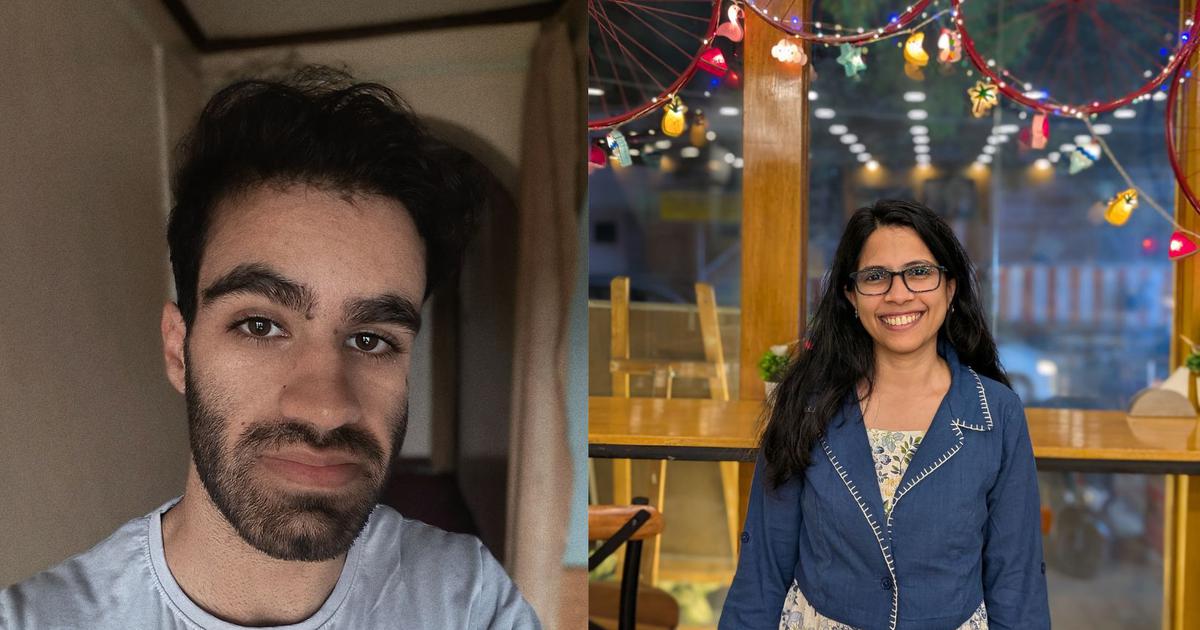The Osmosis Poetry Prize is a newly instituted award founded by poets Yashasvi Vachhani, Kunjana Parashar and Kinjal Sethia. The aim of the prize is to celebrate contemporary Indian poets writing in English. It is awarded to two poets, each winning a cash reward of Rs 10,000 and a citation from an external judge. This year the prize has been won by poets Ifaam Bashir and Zainab Ummer Farook. Sohini Basak was the judge for the inaugural iteration of the prize.
Basak said about Bashir, “In [his] packet of poems, loss and yearning are stitched delicately along the margins of the landscapes and the architecture the poet inhabits. The ghosts who tread these atmospheric poems offer soft and warm solace. Crucially, the deft control of an even-toned yet dreamy register of images and emotions left ample gaps for me, the reader, to dwell in ‘the grammar of absence’: the nooks and crannies of the houses in disrepair, the frayed end of things, fading memories, the whispering moonlight, and allowed me a gentleness to grieve with/in.”
“It is not easy to write a poem about My Neighbour Totoro without going into clichés about trees or cats, but Zainab Ummer Farook’s first poem homing a ‘prolific irumban puli tree/beaded with red ants’ is transformative. The tug of war between childhood and adulting becomes apparent and entertaining in this convincing set of coming-of-age poems. Animated with scenes of feasting and family, of moving and stagnation, lore and pop culture, these poems celebrate tedium and plotless-ness, berate the imposter syndrome, and revel in the slapdash in joyful, meandering ways,” added Basak about Farook.
Here are their winning poems:
Ifaam Bashir
What the Tide Leaves
At dawn, the shore is a ledger –
pages of wet sand where the sea
writes and rewrites itself.
I walk the tideline, collecting
what the night’s waves coughed up:
a starfish, stiff as a leather glove,
a bottle neck, glinting with barnacle teeth,
driftwood carved into bones by the wind.
Once, I found a child’s name
etched in a plank, the letters
sandblasted to ghosts.
Now it sits on my windowsill,
half prayer, half kindling.
The sea doesn’t distinguish.
It returns even our grief
as something useful –
salt for the soil, shells to grind into mortar,
a tin locket, emptied of its face.
They say the ocean keeps nothing.
But tonight, I press my ear to a conch
and hear the static of a thousand hungers –
fish bones humming in the dark,
shipwrecks dissolving into mica,
voices from the past, years gone,
still teaching the waves
the dialect of rain.
I learn to read the tides
by what they abandon:
a frayed net, a rusted hinge,
a single sapphire button.
When I leave,
I take only the cold weight of the horizon,
that blue ache the water stitches to the sky.
Let the gulls claim the rest.
Even their cries are borrowed things.
ghost-threading
The snowmelt river stitches the valley’s hem –
a silver thread unravelling into silt.
I am learning to weave with what remains:
– the wrong side of saffron fields,
burnt threads that outlast the bloom,
– the silence between two strikes
of a moth’s wing against a lantern.
Grandmother called it ghost-threading –
the art of mending holes with light.
Her needles, almond twigs.
Her thimble, a shard of glacier.
I work the way fog writes on mountains:
half-erasure, half confession.
Every knot, a swallowed word.
Every warp, the breath before no
becomes yes.
The loom’s teeth gnaw the yarn to dust.
Still, I spin –
– the ache of unripe apricots,
– the bluedawn cry of a heron
into something that might hold
the shape of leaving.
When they ask where I’m from,
I hand them a spool of smoke.
Some nights, even the river forgets
whether it’s water or the ghost of water.
I knot the frayed ends.
Begin again.
The Museum of Shadows
In the house where the clock’s hands froze,
dust stitches a shroud over the piano’s mute keys.
The walls peel back to reveal their bones –
cracks like maps of roads we never took.
A teacup cracks its porcelain spine,
spilling decades of steeped silence.
The curtains, thin as a widow’s breath,
still tremble when the moon whispers remember.
Outside, the garden knots itself in ivy,
throttling the sundial’s forgotten tongue.
Winter’s teeth gnaw the fence to splinters,
leaving only the scent of almond blooms
to haunt the air – sweet and feral, a requiem
for the unharvested. We buried nothing here,
but the soil remembers what our hands discarded:
a locket’s rusted clasp, a diary’s waterlogged plea,
the ghost of a fire that refused to take.
I pocket a single shard of cobblestone,
cold as the space between two stars.
The house exhales, its rooms collapsing
into the grammar of absence. Tonight,
even the wind hesitates to speak our names.
Zainab Ummer Farook
Epiphany During a Rewatch of My Neighbour Totoro
Some childhood stories are best left untold. If we must,
let it be a movie. The countryside gives way to a town
in the garb of a city; the father is a grim garbled voice
on a five-minute ISD call. Everything else stays as it is:
sick mother sent away, two girls let loose, austere house
reluctant to be home. Days plod into eventless days –
seasons tick by. The girls do their homework and float
paper boats down monsoon’s short-lived rivulets.
There is a cat, of course, and a prolific irumban puli tree
beaded with red ants. The younger child takes a liking
to the puckeringly sour fruit, bountiful clusters promising
a sharp green crunch. The older one prefers to watch
her little sister's face scrunch, an elfin thing unshadowed
by knowledge. Blessed are we, that our memory sieves.
The dregs belong to another movie: wizened neighbour
banging on the front door, throng of people, firefighters,
mother (a limp, wet rat) propped against a stoic uncle.
You recall nothing. I retain the distinction between fell
and jumped, between accident and intent. The truth lies
at the bottom of an old well – a steel bucket that slipped
off its rope, slumbering away on the gravelled bedrock
forested with moss. In that watery grove dwells a spirit:
kind and monstrous, neither rabbit nor cat nor grey owl,
guardian of lost children, benevolent robber of memory.
Mise-en-place
Things are nowhere close
to where they should be.
No home, no bookshelf,
no glassware, no ducks
in a row. No lovers, too.
But there is a tiny kitchen
with a dinged steel plate.
Soak two slices of bread
in milk, a generous pour
of honey. Then, top it off
with a big mango, diced
slapdash. Bliss rigged
in the middle of nowhere.
And you are where you are,
make-do creature digging
into a make-do treat.
Ode to Imposter Syndrome
“I went to sleep a poet and woke up a fraud”
~Fall Out Boy, ‘The Music or the Misery’
Little imp on my right shoulder
nattering into my ear – bless you.
Bless your purple-faced bluster,
your ready cudgel, talons honed
to razor through letter and paper.
Bless your eyes’ ice-white fire,
its jubilant gobbling of drafts.
Bless that pudgy nose fishing
for an iffy simile, bridge wrinkled
in disdain. Bless the eardrums
tuned to suss out discordance.
Bless the tsk and ayye and chee
stuffed into your cheek pouches,
spat and pinged against my skull.
You huffy chipmunk, you skittish
rascal: bless your slingshot aim,
the stone of it whistling sense.
The welts are left to yellow, token
of the world’s largeness: you suck,
this sucks, anyone can do it better.
Bless you for playing two truths
and a lie. You forget that l thrive in
webs of lies, nettling truth for song.
Bless you for picking my shoulder
for a perch, you brave, brave thing –
captive, all you can do now is listen.
Ifaam Bashir is a student of English literature at EFLU, Hyderabad, and is originally from Jammu and Kashmir. He writes poems and short stories, often circling around memory, longing, and the quieter moments of life.
Zainab Ummer Farook firmly believes that picture books are for everyone, even those who call themselves adults. She was a 2023 South Asia Speaks Fellow and won the 2024 Toto Funds the Arts Award for Creative Writing in English. Her poems have been featured in Muse India, Nether Quarterly, and The Bombay Literary Magazine. Having grown up in Kozhikode, she is now amused by Bengaluru's paltry monsoons.










